
Journal of Money Laundering Control
Scope & Guideline
Connecting Researchers and Policymakers for Change
Introduction
Aims and Scopes
- Money Laundering Prevention Strategies:
The journal focuses on various strategies for preventing money laundering, including regulatory frameworks, compliance measures, and risk assessments. It explores how financial institutions and non-financial entities can enhance their practices to detect and prevent illicit financial flows. - Impact of Technology on Money Laundering:
There is a significant emphasis on the role of technology in both facilitating and combating money laundering. The journal includes studies on machine learning, artificial intelligence, and digital currencies, analyzing their implications for detection and prevention efforts. - Global Regulatory Frameworks and Compliance:
The journal discusses international regulations such as those established by the Financial Action Task Force (FATF) and their implementation across jurisdictions. It examines the effectiveness of these frameworks in curbing money laundering and the challenges faced by different countries. - Corruption and Financial Crimes:
A core area of focus is the intersection of corruption and money laundering. The journal publishes research that investigates how corrupt practices contribute to money laundering and the measures needed to combat both. - Emerging Trends in Financial Crimes:
The journal highlights emerging trends in financial crimes, including trade-based money laundering, the use of cryptocurrencies, and the impact of economic sanctions. It aims to provide insights into new methodologies and typologies of money laundering. - Social and Economic Implications:
Research published in the journal also addresses the broader social and economic implications of money laundering, including its impact on economic growth, governance, and the achievement of Sustainable Development Goals (SDGs).
Trending and Emerging
- Technological Innovations in AML:
A significant trend is the increasing focus on technological innovations such as machine learning and artificial intelligence. Research is exploring how these technologies can enhance the detection and prevention of money laundering, indicating a shift towards data-driven approaches. - Cryptocurrency and Digital Assets:
There is a growing emphasis on the implications of cryptocurrencies and digital assets for money laundering. The journal is publishing more research on regulatory responses and the challenges posed by these new financial instruments. - Interdisciplinary Approaches to Financial Crime:
The journal is increasingly featuring interdisciplinary research that incorporates perspectives from law, economics, sociology, and technology. This trend reflects a recognition of the multifaceted nature of money laundering and the need for comprehensive solutions. - Global and Regional Collaborations:
Emerging themes include the importance of global and regional collaborations in combating money laundering. Research is focusing on the effectiveness of international partnerships and mutual legal assistance in addressing transnational financial crimes. - Socioeconomic Impacts of Money Laundering:
There is an increasing awareness of the socioeconomic impacts of money laundering, particularly in developing economies. Recent publications are examining how money laundering affects governance, economic stability, and social equity.
Declining or Waning
- Traditional Money Laundering Techniques:
There appears to be a waning focus on traditional money laundering methods, such as cash smuggling and physical asset laundering, as newer, more complex techniques emerge, such as virtual currency laundering and trade-based laundering. - General Compliance Discussions:
General discussions surrounding compliance measures without a specific focus on innovative approaches or technological integration are becoming less prominent. Instead, there is a shift towards more specialized topics that address contemporary challenges. - National Case Studies without Comparative Analysis:
Research that focuses solely on national case studies without comparative analysis to other jurisdictions is declining. The journal now favors studies that draw parallels and highlight lessons learned across different countries. - Static Regulatory Frameworks:
The exploration of static regulatory frameworks without addressing their adaptability to changing financial landscapes is less common. The journal is moving towards dynamic analyses that consider ongoing regulatory changes and their impacts. - Historical Perspectives on Money Laundering:
There is a noticeable decrease in papers focused on historical perspectives of money laundering practices. Recent publications prioritize contemporary issues and forward-looking solutions rather than retrospective analyses.
Similar Journals
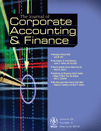
Journal of Corporate Accounting and Finance
Exploring the Nexus of Corporate Finance and AccountingJournal of Corporate Accounting and Finance, published by WILEY PERIODICALS, INC, is a leading interdisciplinary journal that addresses the intricate dynamics of accounting and finance in corporate settings. With its ISSN 1044-8136 and E-ISSN 1097-0053, this esteemed journal has been a significant platform for the dissemination of research since 1989, now influencing discussions and policy formulation until 2024. Holding a prominent position in Q3 in Accounting and Q2 in Economics, Econometrics and Finance as of 2023, it ranks within the 66th percentile for Economics and the 39th percentile for Accounting, reinforcing its credibility in the academic community. The Journal of Corporate Accounting and Finance not only offers unparalleled insights into financial reporting, corporate governance, and ethical financial practices but also aims to foster a deeper understanding of economic theories applied within corporate frameworks. As a subscription-based journal, it remains pivotal for researchers, professionals, and students eager to stay abreast of the evolving landscape of corporate finance and accounting.
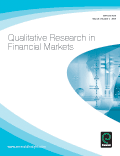
Qualitative Research in financial Markets
Transforming Understanding of Financial PhenomenaQualitative Research in Financial Markets is a premier academic journal published by Emerald Group Publishing Ltd, dedicated to advancing the field of qualitative research in finance. Since its inception in 2009, the journal has established a critical platform for scholarship that transcends traditional quantitative analysis, offering new insights into financial phenomena through qualitative methodologies. With a current impact factor that reflects its reputable standing—ranking in the Q2 category of both Economics and Finance—this journal is an essential resource for researchers, professionals, and students alike. It captures a diverse range of topics that contribute to a deeper understanding of financial markets, making it a vital asset for those looking to explore complex financial narratives. While the journal does not currently offer open access, its rigorous peer-review process ensures high-quality publications that are invaluable in both academic and practical settings. With Scopus ranks affirming its influence in the realms of Finance and Economics, Qualitative Research in Financial Markets stands out as a must-read for anyone engaged in the evolving landscape of financial studies.

Journal of Risk Model Validation
Enhancing Financial Insights with Validated Risk ModelsJournal of Risk Model Validation, published by INCISIVE MEDIA, is a pivotal scholarly platform dedicated to the fields of Applied Mathematics, Economics, Econometrics, and Finance. With an ISSN of 1753-9579 and an E-ISSN of 1753-9587, this journal actively contributes to the advancement of knowledge through the rigorous validation of risk models, which is essential for informed decision-making in business and economic contexts. Although currently not an Open Access journal, it serves a vital role in the academic community, evidenced by its categorization in the Q4 and Q3 quartiles across various relevant fields. As of 2023, it holds commendable Scopus rankings, reflecting its relevance and engagement within the global academic discourse. The journal encourages submissions from a wide array of researchers, professionals, and students until 2024, fostering a comprehensive exploration of risk model methodologies and their practical applications. Emphasizing both theoretical frameworks and empirical studies, the Journal of Risk Model Validation is an essential resource for those dedicated to enhancing the reliability and effectiveness of risk assessment in contemporary finance and economics.
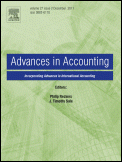
Advances in Accounting
Elevating Standards in Accounting ScholarshipAdvances in Accounting, published by Elsevier, is a pivotal academic journal within the fields of accounting and finance, exemplifying a commitment to the dissemination of innovative research and critical analyses. With its ISSN 0882-6110 and E-ISSN 1046-5715, this journal has evolved since its inception in the early 2000s, now offering a platform for scholars and practitioners to explore cutting-edge developments in accounting frameworks and financial strategies. The journal is recognized in the Q3 category for both accounting and finance as of 2023, reflecting its relevance and contribution to these disciplines. Although it currently does not feature an Open Access option, it remains an invaluable resource for researchers seeking to enhance their understanding of financial complexities and accounting methodologies. With its significant Scopus rankings, including #161 in Finance and #102 in Accounting, Advances in Accounting is essential for those keen on keeping abreast of the latest theoretical and practical advancements in the field.
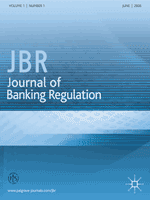
Journal of Banking Regulation
Fostering Insightful Discussions on Economic Trends.Journal of Banking Regulation is a premier academic journal published by Palgrave Macmillan Ltd. based in the United Kingdom, contributing significantly to the fields of Economics and Finance. With an ISSN of 1745-6452 and an E-ISSN of 1750-2071, this journal serves as a vital platform for the dissemination of cutting-edge research that addresses the complexities of banking regulations in a rapidly evolving financial landscape. As a Q3 ranked journal in both Economics and Econometrics and Finance categories, it holds a respectable position among its peers, with Scopus ranks highlighting its impact within the research community (Rank #246/716 and #115/317, respectively). The journal has been converging contemporary studies and analyses since its inception in 2008, and actively invites scholars, professionals, and students to explore its insightful articles. Though primarily subscription-based, readers can benefit from its rigorous content, which aims to inform regulatory practices and foster a deeper understanding of the banking sector's intersection with global economic trends.
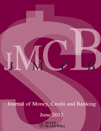
JOURNAL OF MONEY CREDIT AND BANKING
Illuminating the Interplay of Money and MarketsJOURNAL OF MONEY CREDIT AND BANKING, published by Wiley, stands as a premier academic outlet in the domains of finance, economics, and accounting. With an ISSN of 0022-2879 and an E-ISSN of 1538-4616, this journal serves as a vital resource for researchers seeking to explore the dynamic interactions between money, credit, and banking systems. Compiling groundbreaking research since its inception, the journal boasts an impressive Q1 quartile ranking across key categories in the 2023 metrics, reflecting its prestige in the fields of Accounting, Economics, and Finance. It ranks among the top in its class with a Scopus ranking that underscores its contribution and influence in scholarly discourse, especially in the evolving contexts of economic policy and financial markets. Although not available as an open-access publication, the journal’s commitment to high-quality peer-reviewed research makes it indispensable for professionals, students, and academicians aiming to stay abreast of developments in monetary theory and practice. With the aim of fostering scholarly exchanges, the JOURNAL OF MONEY CREDIT AND BANKING remains a cornerstone for advancing understanding and application of critical financial concepts.

Risks is an esteemed Open Access journal published by MDPI, based in Switzerland, dedicated to exploring multifaceted dimensions of risk across various fields, including Accounting, Economics, Finance, and Management. Since its inception in 2013, the journal has fostered academic discourse by providing a platform for high-quality research that addresses contemporary challenges and theoretical advancements within these disciplines. With a commendable ranking in the 75th percentile for Economics, Econometrics and Finance, and distinction in Accounting and Strategy Management, Risks maintains robust academic quality that resonates within the global research community. The journal not only prioritizes accessibility with its Open Access model but also aims to bridge the gap between academia and industry through rigorous peer-reviewed publications. Researchers, professionals, and students alike will find Risks to be an invaluable resource for innovative insights and evidence-based analyses in the field of risk management.
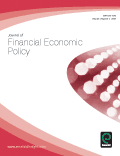
Journal of Financial Economic Policy
Unveiling the intricacies of financial markets through rigorous research.Journal of Financial Economic Policy is a premier academic journal published by EMERALD GROUP PUBLISHING LTD, focusing on the intersection of finance and economics. Through rigorous peer-reviewed research, the journal aims to advance understanding of financial policies and economic frameworks, addressing critical issues faced by financial markets and institutions. With an ISSN of 1757-6385 and an E-ISSN of 1757-6393, it serves as a reputable source of information for researchers, professionals, and students alike. The journal operates within the United Kingdom and is recognized for its contributions to the fields of economics and finance, achieving a Q3 category ranking in both disciplines as per the 2023 metrics. This places it within the top half of journals in its category according to Scopus ranks, demonstrating a solid impact in the academic community. Although it is not an open-access journal, the insights and analyses published are invaluable for those seeking to grasp complex financial phenomena and develop effective policies. The journal’s scope encompasses a wide range of topics relevant to contemporary finance and economic strategies, making it an essential resource for ongoing scholarly discourse and practical applications.

Financial Innovation
Advancing the Future of Finance and TechnologyFinancial Innovation, published by Springer, is a premier open access journal that has been contributing to the fields of finance and management of technology and innovation since its inception in 2015. With an impressive Q1 category ranking in both Finance and Management of Technology and Innovation, the journal places itself at the forefront of academic research, reflected in its Scopus rankings—#17 out of 317 in Finance (94th percentile) and #29 out of 289 in Management of Technology and Innovation (90th percentile). Centered in Germany, this journal aims to disseminate high-quality research that fosters theoretical and practical advancements within its scope, encouraging exchanges between academia and industry. The open access model enhances visibility and accessibility of published research, thus playing a critical role in shaping the future of financial practices and technology management. For researchers, professionals, and students alike, Financial Innovation remains essential for staying abreast of cutting-edge developments and trends in these dynamic fields.
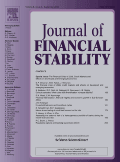
Journal of Financial Stability
Empowering insights into contemporary financial challenges.The Journal of Financial Stability, published by Elsevier Science Inc., is a renowned academic journal that serves as a premier platform for the dissemination of innovative research in the fields of finance, economics, and econometrics. With an ISSN of 1572-3089 and an E-ISSN of 1878-0962, this journal has established itself as a leader in its category, ranking Q1 for both Economics and Finance in the 2023 category quartiles. This positions it amongst the top 13% of journals in Economics and the top 35% in Finance, according to Scopus rankings. Covering a wide range of topics related to financial stability, the journal aims to fulfill its objective of advancing scholarly communication and providing researchers, professionals, and students with valuable insights into contemporary financial challenges and innovations. Operating from the Netherlands and converging from 2004 to 2024, the Journal of Financial Stability continues to contribute significantly to the academic landscape, inviting submissions that push the boundaries of knowledge and understanding in financial systems.